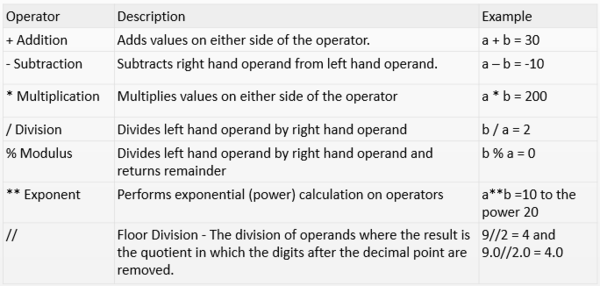Variables - Python
What is a Variable
A variable can be used to store a value within your program. Most languages require you to declare a variable and then assign a value to it, however python does not.
In most languages, a variable is of a specific data type and this can't change during the program. However python will determine the data type to use from the data stored in the variable.
Variables in Python
You need to give a name for the variable and then assign it a value:
counter = 100 # An integer assignment
miles = 1000.0 # A floating point
name = "John" # A string
You could print the current values for each variable:
counter = 100 # An integer assignment
miles = 1000.0 # A floating point
name = "John" # A string
print("counter value is " + counter)
print("miles value is " + miles)
print("name value is " + name)
You can perform calculations with variables:
counter = 100 # An integer assignment
miles = 1000.0 # A floating point
name = "John" # A string
counter = counter -1
miles = 1000 * 5
test = miles / 2
The arithmetic operators in python are:
Now Try
Create a program to convert Pounds Stirling into Euros.
- It should ask the user to input the amount in Pounds to convert.
- It should use the exchange rate of 1.17 Euros to 1 Pound.
- It should display the message:
X Pounds Stirling is Y Euros, at the exchange rate of 1.17 Euros to the Pound
Now create a version of the above program to allow the user to also input the exchange rate to use.
Extension Tasks
- Create a program to calculate the area of a circle
- Create a program to calculate the volume of a cylinder
- Create a program to use Pythagoras theorem
